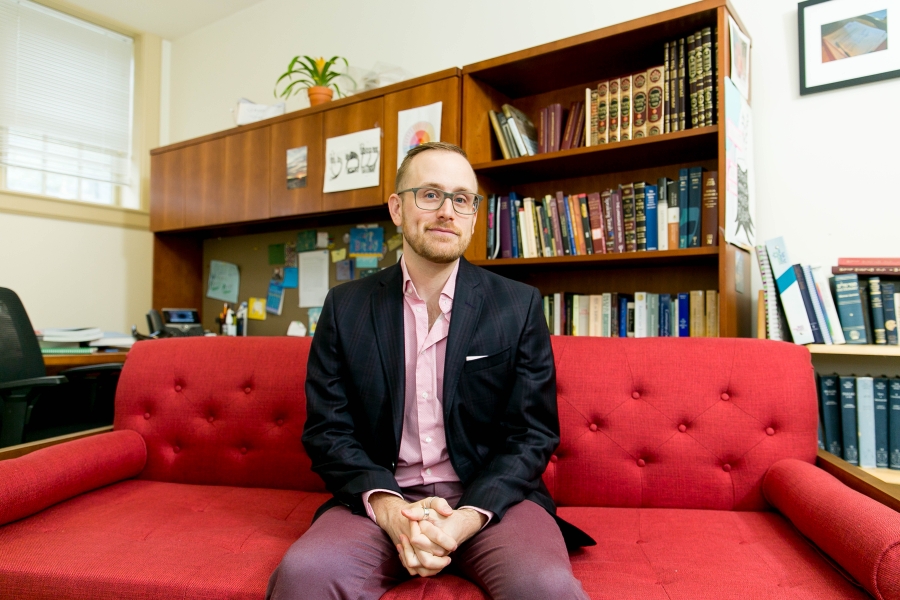Transcription:
You are a laborer. You live in the Upper Galilee, but there this no work there. You need to make money for your family–farming, building, shepherding–you can do it all, but there is no one to do it for. So, your journey south, away from home. Away from the beautiful sea you once lived by, and down into the dryness and heat. You go from town to down, looking for work. There is none.
You try your best to learn new trades along the way. Sewing, hunting. Anything you can do to make yourself more employable. Anything you can do to support your family.
Finally, you make your way to the south–to be’er sheva, a small town–without many laborers. The land is pure desert. The ibexes sit lazily around. The sun keeps them warm but you make sure your skin is covered. You meet an older man who agrees to hire you. For three years, you will work. Your heart rises with the excitement of three years of wages and falls with the idea of being three years away from family.
You are tired from the journey. You know you need this.
You negotiate with this man for your labor.
You agree that after three years, he will give you wages. He will give you produce. He will give you land. He will give you cattle. And he will give you pillows and bedding.
This, you think. This will sustain your family for years to come.
You work for three years. You employ your skills. You develop new skills. The work is hard. You are tired. You are weary. You are determined to bring these earnings to your family.
Three years pass. You have grown fond of your employer and while you are eager to return to your family, you feel a certain sadness as you prepare to say farewell.
You celebrate Rosh HaShanah together one last time. You hear the shofar together. You are grateful to have lived another year.
As Yom Kippur approaches, you approach your employer and ask for your compensation as you prepare your departure.
You say, Give me my wages that I may go and support my family.
He replies, I have no money.
Knowing he is a good man, you think to yourself: perhaps he came across cheap merchandise and purchased it, and therefore does not have money right now.
You say to him, give me produce.
He replies, I have none.
Your heart sinks, but still you trust this man and think: he has not given his portion to God and charity yet and that takes precedence.
You say to him: give me land.
He replies, I have no land.
Your heart sinks lower and your think to yourself: surely, he has leased his land to others and it is not currently available.
You say to him “give me cattle.”
He replies, I have none.
Your heart breaks and think to yourself, perhaps he has hired his cattle out to others.
You say to him, Give me pillows and bedding.
He replies, I have none.
You start to cry and think to yourself, perhaps he has dedicated all his property to the Temple.
You pack up your things. With no earnings. With no produce or land or cattle or money… and head north, back to the Galilee.
You rejoice upon seeing your family. Your cry from the joy of seeing them. You cry from grief over the three years you spend away. You cry from the shame of not bringing anything back with you. You spend Yom Kippur together as a family. Fasting, praying for a better year.
The next day, your employer shows up at your house. He has three pack mules with him, carry food and drink. He brings you all a meal. You are surprised to see him. You introduce him to your family and you eat together.
After the meal, he asks you about your final exchange when he had nothing to give you. You tell him that you thought he had hired his cattle, had bought some merchandise, had leased the land–with each generous thought on your end, tears well up in his eyes and he weeps in gratitude. Each of your thoughts were true, but now are no longer.
He hands over money, bedding, produce, a deed to land that is now yours.
Your family cheers. You will be sustained.
Before he leaves, he says, Just as you judged me favorably, so may the holy one and all those you encounter, judge you favorably.
 Rabbi Alex Weissman was ordained by the Reconstructionist Rabbinical College in 2017, where we studied Torah and served a range of communities including POWER, Avodah, Congregation Beit Simchat Torah, and JOIN for Justice. Alex currently serves as the Rabbinic Organizer at T’ruah: The Rabbinic Call for Human Rights and as the Rabbi at Congregation Agudas Achim in Attleboro, MA. Alex previously served as the Senior Jewish Educator at Brown RISD Hillel for three years and as a Community Care Chaplain with the Faith Matters Network. He serves on the Ethics Committee of the Reconstructionist Rabbinical Association and on the advisory boards of Evolve: Groundbreak Jewish Conversations and the Inside Out Wisdom and Action Project. Alex lives in Providence, RI with his partner, Adam.
Rabbi Alex Weissman was ordained by the Reconstructionist Rabbinical College in 2017, where we studied Torah and served a range of communities including POWER, Avodah, Congregation Beit Simchat Torah, and JOIN for Justice. Alex currently serves as the Rabbinic Organizer at T’ruah: The Rabbinic Call for Human Rights and as the Rabbi at Congregation Agudas Achim in Attleboro, MA. Alex previously served as the Senior Jewish Educator at Brown RISD Hillel for three years and as a Community Care Chaplain with the Faith Matters Network. He serves on the Ethics Committee of the Reconstructionist Rabbinical Association and on the advisory boards of Evolve: Groundbreak Jewish Conversations and the Inside Out Wisdom and Action Project. Alex lives in Providence, RI with his partner, Adam.











